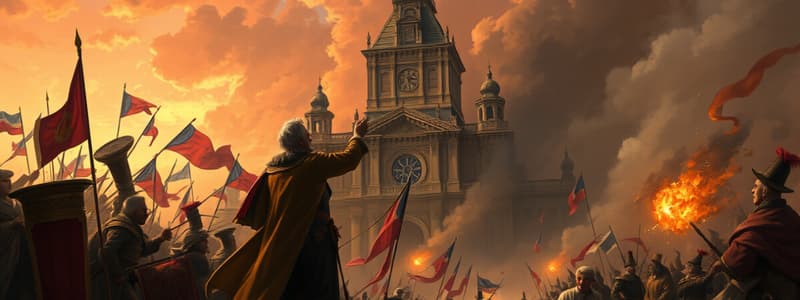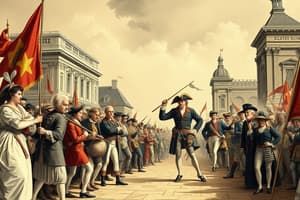Podcast
Questions and Answers
What type of power did King Louis XV assert in his statement regarding sovereignty?
What type of power did King Louis XV assert in his statement regarding sovereignty?
- Conditional power based on public consent
- Absolute power residing solely in him (correct)
- Divided power among branches of government
- Shared power with the nobility
Which of the following factors contributed to the complex society of France in the late eighteenth century?
Which of the following factors contributed to the complex society of France in the late eighteenth century?
- The unification of political ideas under one doctrine
- The decline of the Roman Catholic Church's influence
- Emergence of new ideas about society and competing interests (correct)
- The absence of any social classes
What was one major role of the Roman Catholic Church during the Old Regime in France?
What was one major role of the Roman Catholic Church during the Old Regime in France?
- To facilitate a separation of powers among government branches
- To control the economy and trade practices
- To promote absolute democracy
- To support the absolute authority of the monarchy (correct)
What aspect of legislative power did King Louis XV emphasize in his ruling?
What aspect of legislative power did King Louis XV emphasize in his ruling?
How did King Louis XVI perceive his authority compared to King Louis XV?
How did King Louis XVI perceive his authority compared to King Louis XV?
What statement best reflects the economic conditions of the French people during the Old Regime?
What statement best reflects the economic conditions of the French people during the Old Regime?
What was a significant outcome of the competing ideas in French society during the late eighteenth century?
What was a significant outcome of the competing ideas in French society during the late eighteenth century?
Which of the following accurately describes the beliefs of the French people regarding their political authority before 1789?
Which of the following accurately describes the beliefs of the French people regarding their political authority before 1789?
What was the approximate percentage of workers in cities that were servants during the reign of Louis XVI?
What was the approximate percentage of workers in cities that were servants during the reign of Louis XVI?
What was the primary purpose of the Estates General when it was established?
What was the primary purpose of the Estates General when it was established?
Which factor contributed to the increase in the number of bourgeoisie between the reigns of Louis XIV and Louis XVI?
Which factor contributed to the increase in the number of bourgeoisie between the reigns of Louis XIV and Louis XVI?
Which of the following groups was NOT part of the Estates General?
Which of the following groups was NOT part of the Estates General?
What was a common disadvantage faced by servants in Paris?
What was a common disadvantage faced by servants in Paris?
What significant social change was occurring in France during Louis XVI's reign?
What significant social change was occurring in France during Louis XVI's reign?
How did the attitudes of servants towards their masters generally trend during the time period discussed?
How did the attitudes of servants towards their masters generally trend during the time period discussed?
Which gathering method was commonly used during this period for discussing political ideas?
Which gathering method was commonly used during this period for discussing political ideas?
Which group made up the largest part of the bourgeoisie in France?
Which group made up the largest part of the bourgeoisie in France?
What significant societal change occurred for women in public life within the context provided?
What significant societal change occurred for women in public life within the context provided?
Which monarch's actions are traced as the beginning of the Age of Enlightenment in France?
Which monarch's actions are traced as the beginning of the Age of Enlightenment in France?
What was the approximate increase in the population of France during the reigns of Louis XIV to Louis XVI?
What was the approximate increase in the population of France during the reigns of Louis XIV to Louis XVI?
What luxury goods did the bourgeoisie commonly purchase during this era?
What luxury goods did the bourgeoisie commonly purchase during this era?
What factor contributed to the high turnover rate of servants during the reign of Louis XVI?
What factor contributed to the high turnover rate of servants during the reign of Louis XVI?
What percentage of the overall population did the bourgeoisie represent in France in 1789?
What percentage of the overall population did the bourgeoisie represent in France in 1789?
What percentage of peasants in France worked in agriculture?
What percentage of peasants in France worked in agriculture?
What was a common cause of death among peasants?
What was a common cause of death among peasants?
Which statement best describes the living conditions of the peasants?
Which statement best describes the living conditions of the peasants?
How did the peasants view their social hierarchy?
How did the peasants view their social hierarchy?
What was the primary challenge faced by peasant families?
What was the primary challenge faced by peasant families?
What was the average life expectancy of peasants in the countryside?
What was the average life expectancy of peasants in the countryside?
Which function did the king serve in an absolute monarchy?
Which function did the king serve in an absolute monarchy?
What was a significant demographic characteristic of the peasant population?
What was a significant demographic characteristic of the peasant population?
What does the term 'absolute monarchy' refer to?
What does the term 'absolute monarchy' refer to?
What was the average hardship faced by peasants in their daily lives?
What was the average hardship faced by peasants in their daily lives?
What percentage of land in France was owned by the church?
What percentage of land in France was owned by the church?
What type of law did the northern provinces of France primarily rely on?
What type of law did the northern provinces of France primarily rely on?
Who were often appointed by the king to higher-ranking church positions?
Who were often appointed by the king to higher-ranking church positions?
Which phrase describes the king's acknowledged power during the eighteenth century in France?
Which phrase describes the king's acknowledged power during the eighteenth century in France?
How did the church contribute to the government's decrees or warnings?
How did the church contribute to the government's decrees or warnings?
Why did many French people resent higher-ranking clergymen?
Why did many French people resent higher-ranking clergymen?
What was the main source of revenue collected by the church?
What was the main source of revenue collected by the church?
Which legal code was more prevalent in the southern provinces of France?
Which legal code was more prevalent in the southern provinces of France?
What was a common reaction of the people during the king's coronation?
What was a common reaction of the people during the king's coronation?
What was a significant problem in France during the time described?
What was a significant problem in France during the time described?
Flashcards are hidden until you start studying
Study Notes
Life in Eighteenth Century France
- The Old Regime refers to the political system in France prior to 1789.
- Sovereign power was believed to be centered in the monarchy, with King Louis XV asserting that his courts derived authority from him alone.
- French society faced economic difficulties, widespread poverty, and significant social stratification.
Population and Social Classes
- Peasants constituted over 85% of the French population, primarily working in agriculture.
- Life for peasants was arduous, with high mortality rates; one in five infants died before age one, and less than half reached age fifteen.
- The bourgeoisie, or middle class, numbered two to three million in 1789 and represented roughly 10% of the population, mainly making money through industry and trade.
Living Conditions and Labor
- Peasant families typically lived in one or two-room dirt-floored houses, often shared with farm animals, leading to unsanitary conditions.
- Many workers were employed as servants, accounting for 5-7% of urban populations. They faced strict conditions and were often poorly treated.
Role of the Catholic Church
- The church owned about 10% of French land and collected tithes, contributing to the crown's revenue.
- Lower-ranking clergy were often well-regarded by the local populace, but resentment grew toward higher-ranking clergy who were aligned with the nobility.
- The church played an administrative role, keeping vital records and influencing legal matters across varying provincial laws.
Economic Disparities
- The nobility and the church were exempt from direct taxation, which fostered resentment among the Third Estate (commoners).
- As the bourgeoisie accumulated wealth, they began investing in land and luxury goods, increasing their social influence.
Educational Landscape
- Literacy in France varied widely, with about one-third of the populace literate. A significant disparity existed, as only wealthy boys attended high school.
- The number of newspapers, journals, and libraries increased, allowing for broader discussions of new political ideas, particularly in public coffee houses and salons.
The Estates General
- The Estates General was a representative body consisting of three estates: the clergy (First Estate), nobility (Second Estate), and commoners (Third Estate).
- King Louis XVI could convene this body during crises, but it lacked regular function, complicating representation.
Age of Enlightenment
- The Enlightenment introduced new philosophical ideas about society and governance, challenging traditional beliefs such as the divine right of kings.
- This cultural movement in France was influenced by earlier events, including Louis XIV's policy against French Protestants in 1685.
Studying That Suits You
Use AI to generate personalized quizzes and flashcards to suit your learning preferences.




